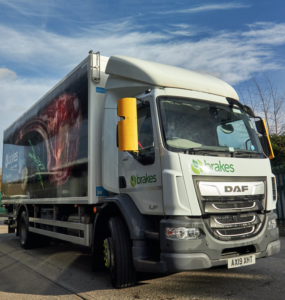Paul Hill chats with Brakes chief executive Hugo Mahoney
How has the pandemic effected Brakes?
In common with the rest of the foodservice industry, the unpredictability and speed of the lockdown created challenges in lost income, increased waste and a rapid need to reduce costs. This has not been universal across all sectors, with a surge in demand in healthcare and in our convenience business, Country Choice. At a category level, we have seen incredible acceleration in non-food interest, in hygiene products and in packaging to facilitate takeaway services.
Our response needed to be definitive to manage this uncertainty, so we have prioritised activities that have a ready market. So, for example we have agreed listings with major supermarket and convenience chains like Sainsbury’s, Iceland and Co-Op, and you can see our Brakes brands sitting proudly alongside more typical grocery brands and own label products.
You may also have heard that we created a collaboration with Bidfood and UK Govt to provide a delivered care box of food and essential products to the shielded vulnerable community. In 9 days we planned, designed and operationalised the service; and we passed a key milestone of the 500,000th box delivered this week. Our friendly and professional drivers are delivering boxes across Great Britain. For many of the vulnerable this is the first person they have seen in weeks and the doorstep reaction can be very emotional as people are so relieved to be getting supplies. Our box pickers & packers and drivers are profoundly motivated and connected to this mission to help their local communities, and serve the nation’s most in need at this time of extraordinary events. It is a very humbling and uplifting experience.
What changes have you made to your operations?
In the healthcare sector we have changed all our delivery protocols to feature appropriate contactless practices, and we are helping our customers re-create menus to feature either less skill due to absence, or less time spent in the kitchens. We have also secured significant numbers of new healthcare customers to Brakes who were struggling to get service elsewhere.
In other areas, however, we’ve been flipping our business model on its head. As out of home demand ground to a halt, the surge into retail created the well-publicised problems of availability. As I have mentioned, we assisted directly with supply into a number of the major supermarket & convenience chains. We have furloughed an appropriate number of our staff, although not as many as you might think as the DEFRA vulnerable shielded service has required significant ops efforts and resources to deliver successfully. We’ve also provided logistics support and resources to other organisations, for example CJ Lang.
Changing from a B2B business model to B2C almost overnight to access a new market has been highly stimulating for Brakes. We have launched a range of consumer services, with call & collect and click & deliver offered from many of our depots. It’s amazing how many foodservice wholesalers have adapted their thinking so quickly, and needs must. I applaud not only Brakes’ business, but also the many other foodservice wholesalers who have taken days or even hours to launch services that might have otherwise have taken weeks or months.
This should remind the whole food and drink industry how creative and resilient wholesalers can be, and that our modern, efficient supply chains can have multiple deployments and purposes.
Read more: Brakes drivers and vehicles added to CJ Lang logistics team
What does your work with the NHS involve during the crisis?
Of course we are prioritising the fantastic efforts of the NHS, and they have our complete admiration. We have been serving their needs supplying the usual catering requirements, but we are also a major supplier to the new pop-up Nightingale hospitals in the various regional locations. In addition, we are working with a number of organisations to provide food options for family feeding so NHS staff do not have to waste time shopping.
 What has your relationship with your suppliers been like since the crisis began? Could they be doing more?
What has your relationship with your suppliers been like since the crisis began? Could they be doing more?
Our suppliers have been unbelievably supportive. For the vulnerable shielded service with DEFRA and the devolved administrations, we have had to identify, negotiate and supply consumer-sized products for the care boxes. This could not have been achieved without the support of suppliers. We have all worked tirelessly to develop solutions to these new requirements.
We mustn’t forget that many suppliers are focussed solely on foodservice, and for them this is a very difficult time. While there may be some increased demand from retail for some, it is a very challenging for many.
Do you think the government’s support package works for the wholesale channel?
Time will tell whether the support package is sufficient, but like the rest of us, they have been working at breakneck speed in unprecedented circumstances. Initiatives like the job retention scheme and relaxation of drivers’ hours certainly helps.
We are staying close to and will evaluate any additional government support be that for all industries or for food wholesaling specifically.
And in terms of our customers, the UK hospitality industry is a huge employer, with a large number of people on lower incomes who will need support until the industry fully recovers, which may be some time to come.
What advice would you give to wholesalers during this difficult period?
Recognise that your strengths go beyond foodservice – use your expertise in food, in logistics, in sales and extend your boundaries. There are some great stories of wholesalers of all sizes doing some amazing things, supporting their local communities and charities.
Read more: Bidfood and Brakes join forces to support the vulnerable









Didn’t talk about the multiple redundancies at brakes though…..? Lots of long serving staff loosing their jobs.